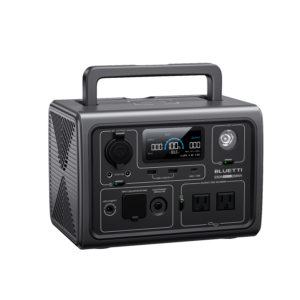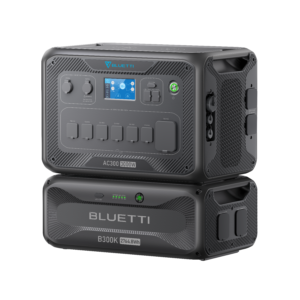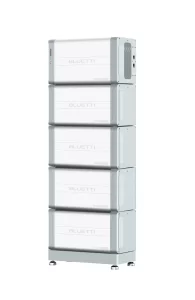By Bart Goossens, Ra Newables Costa Rica
Introduction
Owning a (second) home in Costa Rica comes with many benefits—beautiful landscapes, a relaxed lifestyle, and abundant sunshine. However, one challenge homeowners frequently face is the reliability of electricity. Power outages can range from brief flickers to multi-day blackouts, depending on your location. Investing in a solar battery system can ensure energy independence, protect your electronics, and even help reduce electricity costs.
But what kind of solar battery system do you need? That depends on your situation. Let’s explore the different scenarios and solutions available.
1. Backup for Short and Frequent Power Outages
If you experience frequent but short power cuts (from a millisecond to 30 minutes), you may only need a small backup system:
- Basic solution: A UPS (Uninterruptible Power Supply) will keep your internet router, modem, and access points running, preventing frequent reboots.
- Enhanced solution: If you want to avoid the hassle of resetting appliances like dishwashers, microwaves, or washing machines, a partial or whole-home backup system with a small battery capacity could be a better option.
2. Backup for Long Power Outages
In some areas, power outages can last for many hours or even days. To prepare for this:
- Short-term backup: A system with a larger battery capacity (12–24 hours of backup power) can help.
- Long-term backup: Solar panels + batteries allow you to recharge daily and maintain power indefinitely. This setup also helps cut electricity costs by generating your own energy.
With today’s integrated solar-battery systems, the additional cost of adding solar is relatively low, since the essential components (inverter, control system) are already included.
3. No Utility Service Available (Off-Grid Living)
If your property is truly off-grid, meaning no utility service exists, your only option is a full solar battery system. Some considerations:
- Extending utility lines can cost tens of thousands of dollars.
- A well-designed off-grid solar battery system can provide all your electricity needs for the long term.
- Unlike grid-connected homes, off-grid properties require larger battery storage to compensate for nighttime usage.
- Investing in energy-efficient appliances becomes crucial to minimize energy consumption.
4. Reducing Electricity Costs
Electricity prices in Costa Rica are around $0.30 per kWh, which is relatively high. Before, homeowners could sell surplus solar energy back to the grid at a good rate, but that regulation has changed. Now, you only receive next to nothing for excess energy sent to the grid.
- The best way to save is to use solar power during the day and store excess energy in batteries for nighttime use.
- A solar + battery system typically pays for itself within seven to eight years.
- If you were already considering battery backup, the added cost of solar pays off in just three years.
5. Protecting Electronics from Poor Power Quality
Frequent power fluctuations and outages can damage sensitive electronics. The worst scenario is rapid on-off-on-off cycles, which are common in Costa Rica. This can shorten the lifespan of appliances like:
- TVs, computers, and networking equipment
- Refrigerators and freezers
- Smart home devices
A battery backup system stabilizes power, reducing the risk of damage.
Types of Solar Battery Systems
Now that you’ve identified your energy needs, let’s look at the different types of systems available:
A. Small, UPS-Like Portable Devices
- Basic UPS units from electronics stores provide short-term backup but degrade quickly.

- Lithium-based portable power stations last 10+ years with minimal degradation and much longer warranties.
- Covers essential loads like fridges, lights, and internet.
- More affordable than whole-home backup.
- Some systems can be expanded over time to cover more devices.
- Powers everything, including air conditioners and cooking appliances.
- Exception: Electric instant water heaters require too much power—switching to a tank heater is recommended.
- Allows you to maximize solar energy use and potentially cover 100% of your electricity needs.
Key Considerations When Choosing a Solar Battery System
1. Single-Brand vs. Multi-Brand Systems
- Mixed-brand systems can cause warranty issues—manufacturers may blame each other if something goes wrong.
- Integrated single-brand systems are easier to manage and claim warranty on.
2. Warranty & Support
- Many brands offer 10-year warranties but check where they are serviced.
- If a warranty requires shipping equipment back to the U.S. or China, repair costs may be higher than replacing the unit.
3. Installer Reputation
- Not all installers in Costa Rica follow proper electrical codes or best practices.
- Poor installation can lead to system failures and financial losses.
- Choose a reliable installer with a proven track record.
4. Understanding Key Specifications
When comparing systems, focus on these three main specifications:
- Maximum Power Output (kW): Determines how many appliances you can run simultaneously.
- Battery Capacity (kWh): Dictates how long you can run your home on stored energy.
- Solar Power (kWp): Measures the total power your panels can generate.
These factors directly impact price and performance, so always compare them carefully.
Final Thoughts
Choosing the right solar battery system depends on your specific needs, whether it’s backup for short outages, protection against long blackouts, or total off-grid independence. By considering your energy usage, budget, and property location, you can find the perfect solution for your home in Costa Rica.
If you’re interested in exploring solar and battery options, feel free to reach out! A well-designed system can provide peace of mind, save you money, and ensure reliable power for years to come.



